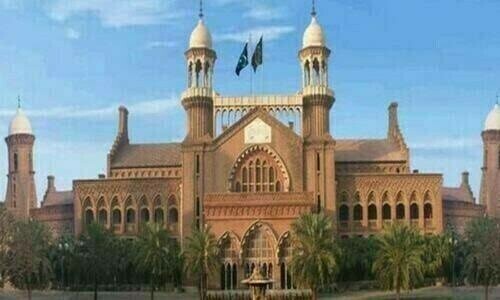THE ‘foreign hand’ is a familiar scapegoat in Pakistan, often trotted out by the authorities in the aftermath of internal disturbances or acts of terrorism. Yet these allegations are rarely corroborated with hard evidence linking disruptive activities to external players.
But the cache of arms and explosives unveiled in Quetta by the Balochistan home minister on Thursday could indicate an exception.
The massive haul, which reportedly consisted of around 4,000kg of explosives along with a host of other deadly paraphernalia, was recovered in raids conducted in different parts of the province, including areas near the Afghan border.
The provincial home minister linked the weapons to Indian and Afghan intelligence agencies, saying these states were involved in supporting banned militant groups in Balochistan and that the explosives were to be used during Muharram.
This is not the first time government officials have named India and Afghanistan as alleged backers of terrorism. Former interior minister Rehman Malik, while in office, claimed he had ‘solid evidence’ of these states’ involvement in Balochistan, adding that he had raised the issue with the Indian authorities.
Mr Malik repeated these claims last week, following the failed attempt on Maulana Fazlur Rehman’s life in Quetta.
We believe, considering the sensitivity of the claims, that it is the interior minister who should have briefed the nation about the weapons’ haul.
If there is indeed solid proof of foreign involvement in Balochistan’s security situation, his ministry must give additional details, while the Foreign Office must take up the issue with the capitals concerned. As we see, in geopolitics, it is the amoral concerns of realpolitik rather than principles that guide a state’s policies.
So it is entirely possible that foreign players are meddling in Pakistan’s internal affairs, just as others at times blame this country of stirring trouble in their backyards.
The point is that it is our lack of vision and lawlessness that gives internal and external actors a chance to exploit the situation. Whether it is the separatist insurgency in Balochistan, the Islamist militancy in Fata, or sectarian terrorism and ethnic violence in Karachi, these sore spots can be exploited because the state has failed to frankly and judiciously address these problems.
Leaving these open wounds to fester will only make them more vulnerable to foreign interference. So while we need to be vigilant about external intervention, we primarily need to set our own house in order.
Published in Dawn, November 1st , 2014










































